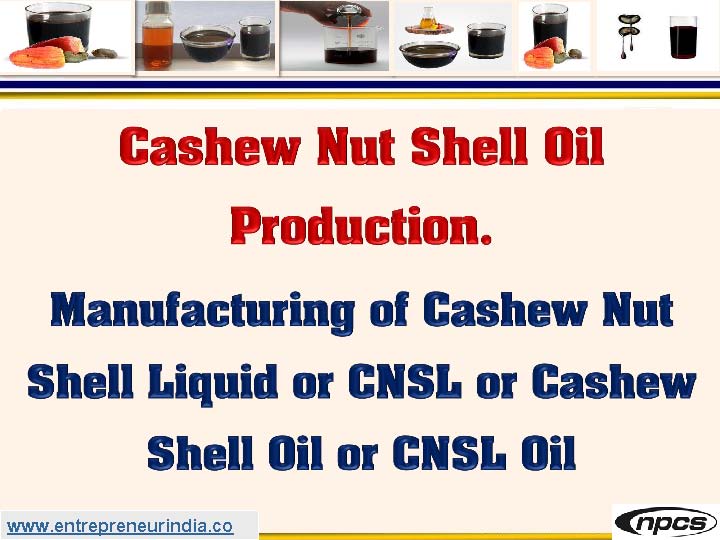
he cashew nut shell oil production industry is an emerging segment of the agro-processing sector that transforms agricultural waste into a valuable industrial raw material. Cashew nut shell oil (CNSO), extracted from the soft honeycomb shell of the cashew nut, is a dark reddish-brown liquid rich in phenolic compounds. With its excellent chemical properties and industrial significance, CNSO is widely used in brake linings, surface coatings, paints, varnishes, plastics, resins, and friction-resistant materials.
As global demand for eco-friendly, bio-based chemicals increases, the production of cashew nut shell oil offers entrepreneurs, agro-industries, and exporters a lucrative business opportunity with sustainable potential.
Market Potential and Importance of CNSO
The cashew nut shell oil production business thrives on a simple yet powerful principle: value addition from agro-waste. India, being one of the largest producers of cashew nuts, generates abundant cashew shells as a by-product. Instead of discarding them, these shells can be converted into CNSO—a commercially valuable product with significant export potential.
CNSO is rich in anacardic acid, cardanol, and cardol, which have diverse industrial uses. The global market for CNSL-derived chemicals is expanding, driven by increased demand for bio-based polymers, automotive components, and corrosion-resistant coatings.
Applications of Cashew Nut Shell Oil
CNSO is a versatile product use across several industries:
-
Automotive Industry: Used in the production of brake linings, clutch facings, and vibration dampers
-
Paints and Coatings: Acts as a binder and drying agent in protective coatings
-
Adhesives and Sealants: Enhances thermal resistance and flexibility
-
Resin and Plastic Industry: Used in manufacturing epoxy resins and phenolic resins
-
Surface Treatments: Provides anti-corrosive, chemical-resistant properties
-
Pesticides and Fungicides: Certain derivatives are use in crop protection formulations
-
Wood Preservatives: Acts as a natural insect-repellent and preservative
These applications make CNSO a high-value industrial product derived from an otherwise discarded agricultural by-product.
Types of Cashew Nut Shell Oil
There are two major types of CNSO based on the extraction method:
-
Natural CNSL: Extracted without heat or chemicals, preserving most of the anacardic acid
-
Technical CNSL (TCNSL): Obtained by heating shells, usually in a drum roasting or hot oil bath, resulting in a product rich in cardanol
Both types have different industrial applications. TCNSL is most commonly used in commercial settings due to its thermal stability and chemical reactivity.
Raw Material and Procurement
The raw material for CNSO production is the cashew nut shell, which is obtained as a waste by-product during cashew kernel processing. Key sources of cashew shells include:
-
Cashew processing factories
-
Cashew kernel exporters
-
Cashew hulling and shelling units
The shells are typically sun-dried and stored in bulk before being fed into the extraction unit. A well-connected sourcing network is essential for continuous production.
Manufacturing Process of CNSO
The cashew nut shell oil production process involves thermal or mechanical extraction methods. The two most widely used methods are:
1. Hot Oil Bath Process
-
Shells are fed into a heated oil bath (generally at 180–200°C)
-
Thermal pressure causes the CNSL to ooze out of the shells
-
Oil is collected from the surface, filtered, and stored in drums
-
Shell residue is removed, often used as fuel in the same plant
This method is efficient and produces technical grade CNSL with high cardanol content.
2. Drum Roasting Method
-
Shells are roasted inside a rotating drum
-
As they heat up, oil seeps out and is collected in a trough below
-
The product is filtered and cool
-
Vapors and fumes are manage using scrubbers or condensers for environmental compliance
Other extraction methods include solvent extraction and expeller pressing, but hot oil bath remains the most commonly used on an industrial scale.
Machinery and Infrastructure Required
Setting up a CNSO production unit requires the following key equipment:
-
Cashew Shell Crusher (optional)
-
Hot Oil Bath Unit or Rotary Roaster
-
Oil Collection Trough and Filtering System
-
Storage Tanks or Drums
-
Heat Exchanger or Furnace (biomass or gas-powered)
-
Safety Gear and Emission Control Equipment
For a small to medium-scale plant (1–2 tons/day), the estimated setup cost ranges from ?25–?50 lakhs depending on capacity and automation.
Quality Standards and Storage
Quality parameters for CNSO include:
-
Viscosity and Density
-
Cardanol and Anacardic Acid Content
-
Flash Point and Acid Value
-
Ash and Impurity Content
CNSO should be store in seale metal drums or HDPE containers under a cool, dry environment to prevent degradation. If exporting, adherence to REACH compliance (EU), and safety data sheet (SDS) documentation is mandatory.
Environmental and Safety Considerations
The production of CNSO involves high-temperature processing, requiring:
-
Proper ventilation and fume extraction systems
-
Oil spill prevention and fire control measures
-
Use of protective gear for workers
-
Safe handling of residue and wastewater
-
Disposal or reuse of shell cake (used as fuel or fertilizer)
Sustainable practices and emission control are crucial for obtaining environmental clearance and community acceptance.
Licensing and Regulatory Compliance
To operate legally, a CNSO production unit must acquire:
-
Factory License and Pollution Control Clearance
-
GST and MSME Registration
-
Fire Safety Certification
-
Export License (if selling globally)
-
Hazardous Substance Handling License (for large-scale storage or processing)
Compliance with ISO 9001, ISO 14001, and OHSAS 18001 further boosts product credibility in domestic and global markets.
Market Trends and Business Potential
The global CNSO market is growing steadily due to:
-
Shift toward bio-based alternatives to synthetic resins
-
Boom in the automotive and construction sectors
-
Rising demand for eco-friendly chemicals and coatings
-
Government support for waste valorization and circular economy
-
Untapped potential in export markets across Africa, Europe, and Southeast Asia
By-products like shell cake (biomass) and cardanol-based resins offer opportunities for product diversification and value addition.
Conclusion
The cashew nut shell oil production business represents a powerful model of sustainable industrial development—converting agro-waste into high-demand, eco-friendly chemicals. With relatively low raw material cost, increasing industrial applications, and growing export potential, CNSO manufacturing offers a scalable, profitable, and environmentally responsible business opportunity. Backed by the right infrastructure, certifications, and market linkages, this venture can deliver long-term economic and ecological returns.
Niir Project Consultancy Services
An ISO 9001:2015 Company
106-E, Kamla Nagar, Opp. Spark Mall,
New Delhi-110007, India.
Email: npcs.ei@gmail.com , info@entrepreneurindia.co
Tel: +91-11-23843955, 23845654, 23845886, 8800733955
Mobile: +91-9811043595
Website: www.entrepreneurindia.co , www.niir.org





